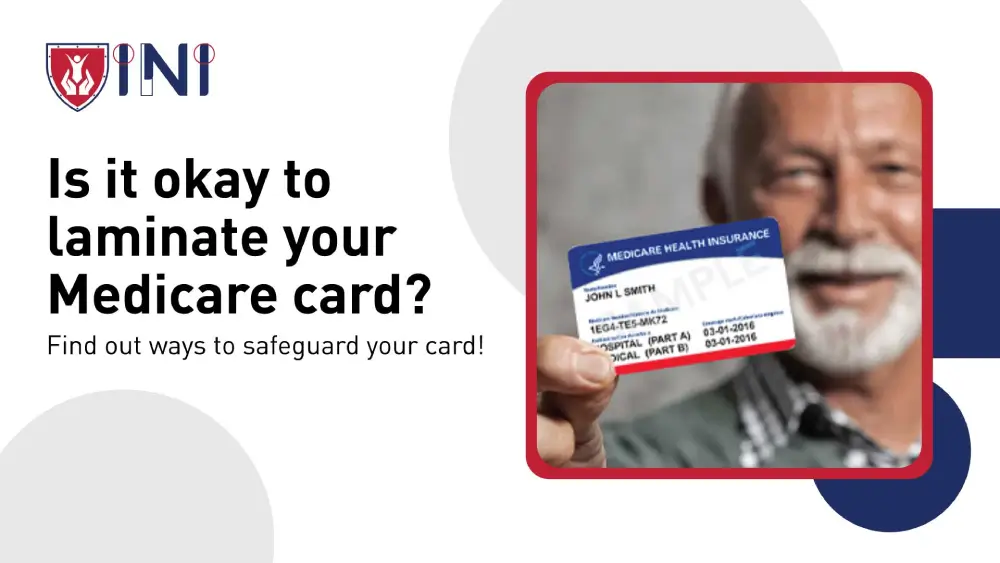Protecting Your Medicare Card: What to Do When You’ve Lost It
Losing Important documents can be a hassle, especially when it’s something as vital as your lost Medicare card. It’s the key to accessing vital healthcare services, and without it, you might find yourself in a tough spot. If you’ve ever lost your Medicare card, you might be familiar with the panic and stress that can accompany such a situation.
There is only one common solution that people consider, and that is laminating their Medicare card to prevent damage and loss. But is it a good idea? Let’s delve into the pros and cons of laminating your Medicare card and explore alternative solutions to safeguard this crucial piece of identification
Why the Fuss About the Medicare Card?
Before we dive into whether or not you should laminate your Medicare card, let's understand why it's such a big deal. Your Medicare card is not just a piece of plastic; it holds a wealth of information that is tied to your healthcare benefits:
-
Your Medicare card number is a unique identifier linked to your healthcare records.
-
Personal information such as your name, gender, and date of birth.
-
The type of Medicare coverage you have, whether it’s original Medicare or an Advantage plan.
-
The effective dates of your coverage.
-
Losing your Medicare cards means potentially exposing this sensitive information, which could lead to identity theft or fraudulent use of your benefits.
Pros and Cons of laminating your Medicare card
| Pros | Cons |
|---|---|
| 1. Physical Protection:Laminating your Medicare card can provide a layer of protection against wear and tear, and other physical damage. | 1. Scanning Issues:Laminating your card can make it difficult to scan the barcode or QR code, which is sometimes required for medical appointments and verification. |
| 2. Durability:Laminated cards are more durable and less likely to be accidentally damaged or torn compared to non-laminated ones. | 2. Information Updates: If any information on your card changes, such as your name or coverage, you won’t be able to update it on the laminated card. |
| 3. Longevity:The lamination can extend the lifespan of your card, reducing the need for frequent replacements. | 3. Identity Theft Concerns:If you lose a laminated card, the finder has access to all the information on the card, increasing the risk of identity theft. |
| 4. Waterproofing:Getting your card laminated, prevents it from liquid damage, such as accidental spills or exposure to moisture. | 4. Incompatible with technology:Some healthcare providers, require you to present scannable card proof of identity and laminating might cause an issue while the card is being scanned. |
| 5. Visibility:It enhances the card visibility, as any dirt smudges, or fades can be wiped out easily. | 5. Misalignment:If the card is not laminated by professionals, there are higher chances for your card to be mishandled which leads to scratches, air bubbles, or damage. |
Bruce Schneier a cyber security expert says that “ The only security that is 100 percent effective is abstinence.” While you can’t entirely abstain from using your Medicare card, you can certainly take steps to use it wisely and protect it.
Lost your Medicare Card What Should you do next?
Losing your Medicare card can be unnerving, but there are 3 steps you can take to address the situation.
-
Stay Calm: Losing a card is frustrating, but staying calm will help you to think clearly and take appropriate action.
-
Contact Medicare: Reach out to Medicare as soon as possible. This ensures they can prevent unauthorized use of your card and issue you a replacement.
-
Identity Theft: If you’re worried about identity theft due to a lost card, consider placing a fraud alert on your credit reports.
In a dilemma about laminating your Medicare Card?
Now the big question is can you laminate your Medicare card? As a short answer it is a no, and here are the main 3 reasons why:
-
Technology Limitations: Most Medicare cards have security features, and at times the Medicare card number might be affected and can be damaged by the lamination process, rendering the card invalid.
-
Replacement Difficulties: If you laminate your card and it becomes damaged or unreadable, you might face challenges when trying to get a replacement.
-
Updating Information: Laminating the cards may make it impossible to update the information if necessary. For instance, if you change your name, address, or other details, then you have to get a new card.
Alternative to Lamination
-
Use a Protective Cardholder: Instead of Laminating, Consider using a protective sleeve or a cardholder to keep your Medicare card safe from damage.
-
Save Digital Copies: Take a photo or scanned copy of your Medicare card and store it securely on your phone or computer. This provides a digital backup without compromising the physical card.
Facts Time
To ensure the security features of your Medicare card are not compromised, you must use a protective sleeve instead of laminating it. Lamination poses a risk that should not be taken lightly, so take the necessary steps to protect your card today.
6 Essential Tips to Fortify Your Medicare Card Safety
-
Secure Your Identity: If you suspect that your card has been stolen or used by someone, firstly consider placing a fraud alert or freeze your credit to prevent potential identity theft.
-
Keep it in a Safe Place: Treat your Medicare card like you would treat a credit card or other sensitive personal identification. Store it in a safe and secure place, such as a locked safe, or a document folder designed for important stuff.
-
Don’t Share Your Information: Never share your Medicare card number, Social Security number, or other information with anyone who shouldn’t have access to it. Be cautious when providing this information over the phone, online, or in person. Medicare representatives will not call or email you asking for your personal information.
-
Don’t Carry it Unnecessarily: While it’s important to have your Medicare card available when you need it, avoid carrying it in your wallet or purse daily. Instead, take it out only when you have a healthcare appointment or need to use it for a specific purpose.
-
Make Use of Digital Copy: If possible, consider scanning or photographing your Medicare card and storing a digital copy always on your secure device. This way, You can leave the physical card at home and still you can have access to your information when it is needed.
-
Frequently Monitor Your Statements: Regularly review your Medicare summary notice and any other healthcare statements you receive. Look for any suspicious activity. If you notice any unfamiliar charges, report them immediately to Medicare and your healthcare provider.
The Numbers Speak- Medicare Card Loss Statistics

-
According to the CMS report, Medicare processes over 4.5 million claims daily, resulting in an estimated loss of over $700 billion due to fraud, waste, and abuse in the US healthcare system.
-
CMS received nearly 40,000 beneficiary complaints regarding plan marketing last year, up from 5,700 in 2017.
-
Law enforcement officials estimate that fraudulent accounts have raised to 10% of Medicare's annual spending.
The Bottom Line
Your Medicare card is more than just a piece of plastic, it is your ticket to essential healthcare services. While laminating might seem like a good idea, it’s best to steer clear of this practice due to potential complications. Instead, focus on keeping your card secure and memorizing your Medicare card number. By following these simple and essential tips and steps, you can ensure that your access to healthcare remains uninterrupted even if you’ve lost your card.
Remember that safeguarding your Medicare card is a small effort for the peace of mind it brings. Stay proactive, and informed, to keep your healthcare access intact.
Know more about Medicare and its coverage options!
Did you find this article helpful? Share it!







